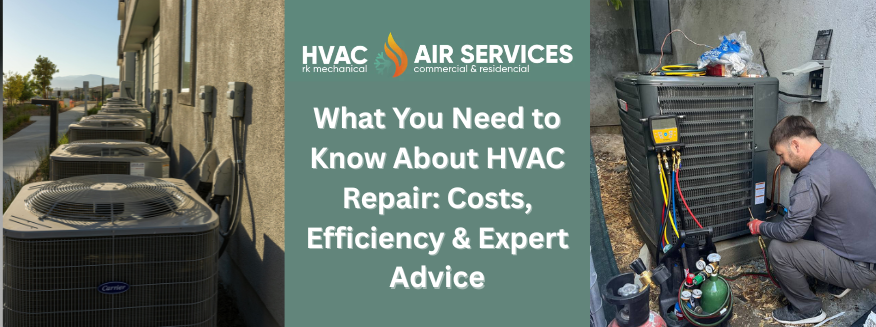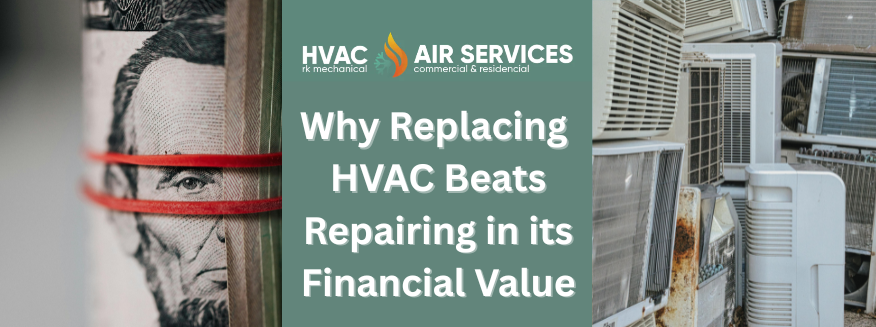When your home’s comfort system starts acting up, knowing what to do next can make all the difference. HVAC repair isn’t just about fixing a faulty unit — it’s about restoring comfort, improving energy efficiency, and extending your system’s lifespan. Whether you’re dealing with strange noises, inconsistent temperatures, or rising utility bills, this guide will walk you through what HVAC repair really means, what to expect, and how to make smart decisions when problems arise.
What Is HVAC Repair?
HVAC repair refers to the professional servicing of heating, ventilation, and air conditioning systems to restore function, efficiency, and safety. It may involve:
- Replacing worn-out components like motors, capacitors, or compressors
- Recharging refrigerant or fixing leaks
- Cleaning clogged coils or filters
- Diagnosing electrical faults or thermostat issues
Unlike seasonal maintenance, HVAC repair is reactive — it’s triggered by a noticeable decline in performance, unusual behavior, or outright failure. Timely intervention not only saves money but can also prevent full system replacement down the line.
Common HVAC Repair Issues
HVAC systems are complex, and small faults can snowball into big discomforts. Here’s what most homeowners encounter:
- AC not cooling properly: Often caused by dirty filters, refrigerant leaks, or failing compressors.
- Strange noises or smells: Banging, whistling, or burning odors usually signal mechanical or electrical issues.
- System freezing up: Dirty coils, low refrigerant, or airflow restrictions are common culprits.
- Unexpected shutdowns: A faulty thermostat, motor failure, or power supply problem might be to blame.
Most of these issues are fixable — but early diagnosis is key.
Cost of HVAC Repair
The cost of HVAC repair depends on your system type, the severity of the issue, and the specific components involved. Here’s a ballpark range:
| Type of Repair | Estimated Cost (USD) |
|---|---|
| Thermostat replacement | $100–$250 |
| Capacitor or relay repair | $150–$300 |
| Refrigerant recharge | $200–$500 |
| Blower motor replacement | $400–$700 |
| Full system diagnostics | $75–$150 |
Many HVAC companies offer flat-rate diagnostics and financing options — something worth asking about during your service call.
Efficiency & Lifespan Tips
If you’re wondering how to prevent future breakdowns, here’s how to keep your system humming:
- Schedule annual tune-ups (ideally in spring or fall)
- Replace air filters every 1–3 months
- Clean vents and clear outdoor units of debris
- Use programmable or smart thermostats
- Upgrade insulation and seal air leaks for better performance
The average HVAC system lasts 10–15 years — regular care can stretch that toward the upper limit.
When to Schedule Repairs
Don’t wait until your system breaks down entirely. Book repairs when you notice:
- Uneven heating/cooling
- Persistent noises
- Increased energy bills
- Short cycling (frequent start-stops)
Off-peak seasons (spring and early fall) often mean faster service and seasonal discounts.
FAQ: What People Ask About HVAC Repair
❓ Why is my AC not cooling properly?
Common reasons include low refrigerant, dirty coils, or a broken compressor. A technician can pinpoint the issue quickly.
❓ Why does my HVAC system make strange noises or smells?
Clanking may indicate loose parts; whistling could mean airflow restriction. Musty smells may hint at mold in ducts or filters.
❓ What does it mean if my HVAC keeps freezing up?
Poor airflow, dirty coils, or refrigerant imbalance can all cause freeze-ups — professional cleaning and inspection are essential.
❓ Can I fix HVAC issues myself?
Basic tasks like changing filters or resetting thermostats are DIY-friendly. But electrical repairs and refrigerant work require licensed professionals.
❓ How often should I service my HVAC system?
At least once a year. Fall for heating systems, spring for cooling.
❓ How much does HVAC repair cost?
See our cost section above — most repairs range from $150 to $700, depending on the issue.
❓ Should I repair or replace my HVAC system?
If repair costs exceed 30–50% of replacement value and the unit is over 10 years old, replacement may be more cost-effective.
Final Thoughts
HVAC repair doesn’t have to be stressful. With a little knowledge, smart timing, and expert support, you can keep your home comfortable year-round without breaking the bank. Be proactive, trust professionals, and know when to upgrade.
When it comes to HVAC repair, RK Mechanical stands out as the reliable choice for homeowners seeking comfort, efficiency, and peace of mind. With over 25 years of experience and certifications like NATE and Dakin® Factory Authorized Dealer status, their technicians bring unmatched expertise to every job — from emergency fixes to comprehensive upgrades. RK Mechanical offers transparent pricing, extended warranties, and rebate guidance that can help you save up to $8,000 by switching to energy-efficient systems. Their commitment to clean installations, responsive communication, and proactive follow-up ensures that your HVAC system runs smoothly long after service. Backed by their Comfort Club membership with priority scheduling and annual tune-ups, RK Mechanical isn’t just another repair service — they’re your long-term partner in home climate control.





































